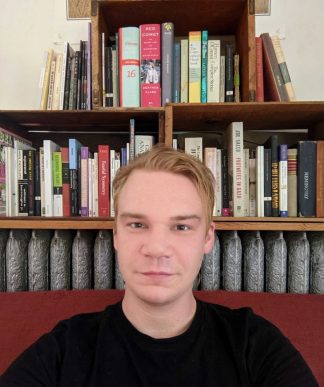By Allison Campbell-Jensen
Whether digging in archives for a publisher, a professor, or creative professionals, a researcher by proxy needs a great eye and a good attitude. Joseph Moen has both.
That’s what Richard Donnelly found. He became fascinated by the work of costume and set designer Desmond Heeley, who spent much of his career at the Guthrie Theater and whom the New York Times called an “alchemist of theater design.” A costume designer himself and a professor of Film, Television, and Theatre at the University of Notre Dame, Donnelly started researching Heeley in 2004.
As he approached his retirement, Donnelly planned to develop his research into a full biography of Heeley. The Performing Arts Archives at the University Libraries holds some materials that Donnelly wanted to see — costume and set design sketches, drafts, notes, and 3D miniature renderings — but the pandemic made it impossible for him to travel from Notre Dame, Indiana. So, on the recommendation of Curator Cecily Marcus, he hired independent researcher Joseph Moen to help him examine the Desmond Heeley Papers.
Formerly a student staff employee in the Performing Arts Archives, Moen brings prior research experience and a strong measure of enthusiasm to the work.
Rare resources
“They can make the most beautiful things out of absolute junk that people have thrown away.”
—Richard Donnelly
Desmond Heeley was of what Donnelly calls the old stock of designers who came out of England in the 1940s and ’50s.
“They can make the most beautiful things out of absolute junk that people have thrown away,” Donnelly says. “In Desmond’s work, that is what he is known for. In the final show that he did on Broadway, ‘The Importance of Being Earnest,’ this huge chandelier is hanging above the stage — made out of plastic beakers and champagne glasses — but it looked like the most expensive crystal chandelier.”
That mastery led to the alchemist title, Donnelly says.
Along with Broadway productions, Heeley created costume and scenic designs for the Guthrie Theater and the Stratford Festival in Canada. When he passed away in 2016, Marcus was one of four archivists invited to visit his New York City apartment and collect items for the Libraries’ collection. Other parts of the Heeley collection are held by the New York Public Library for the Performing Arts, the Stratford Festival, and the McNay Art Museum in San Antonio, Texas.
Among the materials that came to the University were design sketches from Heeley’s early career at the Guthrie up until Heeley’s death. In addition, there were extensive personal papers, including letters that Heeley wrote to people. “I’m not sure how he has them back,” Donnelly says.
Also there are letters of recommendation, including one from Sir Lawrence Olivier. “Even someone of [Heeley’s] stature needed recommendations,” Donnelly says.
Working with Moen
After Marcus introduced them online, Donnelly found Moen incredible to work with. Moen would call or send an email saying, “You won’t believe what I found!” Moen enjoys surprising clients with materials they didn’t expect or didn’t know existed.
Along with being excited about finds, Moen also is a careful researcher. “He was so meticulous, so detailed, and so organized. Everything he did for me was so well-documented, I could not have asked for anyone better as a research assistant,” Donnelly says. “I would not have done it as well myself.”
Another of Moen’s clients is Emilie Buchwald, co-founder of Milkweed Editions, a nonprofit literary press. She is writing a history of Milkweed’s first 25 years for a book celebrating the press’s 40th anniversary, to be published this fall. The Upper Midwest Literary Archives hold most of Milkweed’s documents, so Buchwald hired Moen to help her research.
She is enthusiastic about Milkweed’s recent success.
“They just this this year had two books on the New York Times bestseller list,” Buchwald says. “When I left [in 2003], there were more than a million books in circulation and now it’s more like three and a half million.”
She also found Moen’s research assistance wonderful. “He very beautifully looked through everything and found everything he could that was relevant.”
For his part, Moen finds it satisfying to make archival materials available.
“The archives house so much history that is meant to be engaged with — I love helping make that material known, putting it to use,” he says.
He now is serving as a researcher by proxy diving into the Guthrie Theater archives for a documentary filmmaker working on a movie about Tyrone Guthrie.





